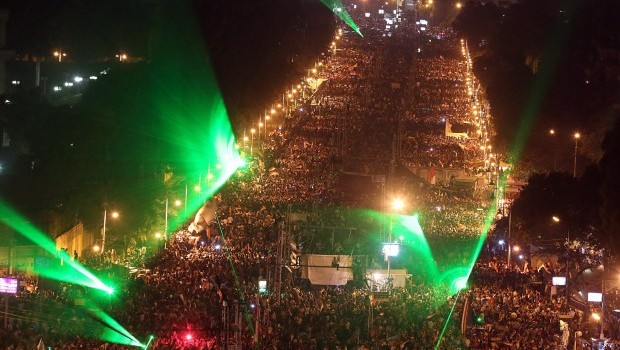
Opponents of Egyptian President Mohamed Morsi participate in a protest in Cairo, Egypt, 02 July 2013.
Source: EPA/Mohammed Saber
After the unprecedented number of protesters that turned out to call for Mursi’s ouster on Sunday, June 30, and the ultimatum given by the Supreme Council of the Armed Forces (SCAF) on July 1, it seems the end of President Mohamed Mursi—and perhaps even the Muslim Brotherhood’s dominance—is at hand.
This turn of events was not entirely unexpected having watched the build-up of the Tamarrod (rebellion) campaign in the past weeks, as well as the evolution of the opposition National Salvation Front (NSF). Added to this mix was Mursi’s steady self-inflicted decline in credibility and the increasingly explicit statements of General Abdel-Fattah El-Sissi, the head of the SCAF, warning the Muslim Brotherhood–led government that the army is watching events closely and does not rule out intervening on behalf of the people.
The big unknown in the lead up to June 30 was, and indeed still is, what happens next and how will Egypt move from the kind of mass unifying protests that inspired the January 25 uprising and brought millions into the streets on Sunday, to a political process that is able to represent the multitude of interests and satisfy often divergent aspirations through a stable and legitimate political system.
On Sunday Tamarrod announced that their petition calling for early elections had reached twenty-two million signatures. If accurate, this represents a higher number than the total number of voters in the second round of the presidential elections that saw Mursi elected just over a year ago. This raises interesting questions on the issue of legitimacy.
The legitimacy of Mursi as an elected president is the only defense the Muslim Brotherhood has been able to put forward, but is a president elected by eleven million people still legitimate when twenty-two million have signed a petition calling for a withdrawal of confidence in him and new elections?
The institution of election is established as a tangible marker for democracy but, as we know from Mubarak’s presidency and other autocratic regimes, elections do not automatically equal democracy. In fact they are a vehicle for the abuse of democracy when they are used to fraudulently claim legitimacy. This shadow hangs over the results of Egypt’s presidential election due to a case brought by Ahmed Shafiq, Mursi’s rival presidential candidate in the elections, claiming that they were fraught with irregularities.
The evidence of ongoing protests confirms that Egyptians are engaged in Egypt’s political destiny and deeply desire democracy. Yet this engagement has not translated into high participation at the ballot box. This indicates a lack of trust in the institutions of democracy as they currently exist in Egypt. Without this trust, elections cannot bestow the legitimacy that the office of the president and the democratic process require.
But protests are not enough either. Demonstrations have worked when they brought people together for a purpose beyond agendas and ideologies. What happened after January 25 was a disintegration into parties and fronts, all battling for their own interests. The result was terrible violence and fragmentation.
Again on June 30 people united behind the banner of Irhal! (leave!). The challenge is translating this inclusiveness and unity, which is easy to achieve behind a simple slogan, into a long term political solution. The pro-Mursi protests have been dwarfed by the Tamarrod protests but both sides are waving Egyptian flags. And this is how these two polarized groups are reconciled, by placing the need to solve Egypt’s immediate problems above ideology and power grabbing. Otherwise, a renewed period of heightened violence is all that we can expect from 30 June onwards.
